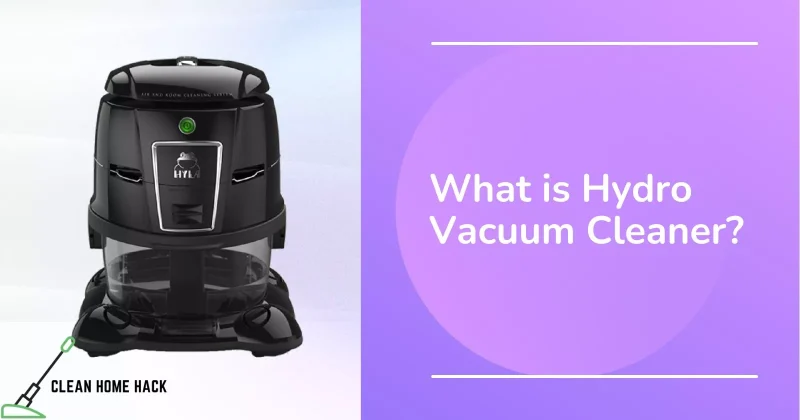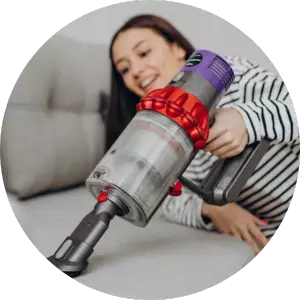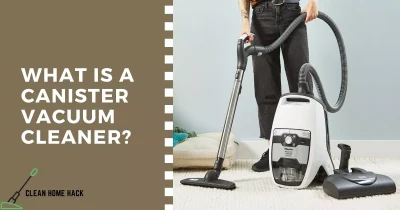What is Hydro Vacuum Cleaner?

 The Short Answer is: The Short Answer is: |
| A Hydro Vacuum Cleaner, also known as a hydro-vac, is an industrial cleaning tool that combines high-pressure water and suction to effectively remove unwanted material from around underground utilities and other areas. It is a powerful and efficient cleaning tool that can be used on a variety of surfaces, including hardwood, tile, marble, and laminate. |
Keeping our homes clean is essential for our health and well-being. With the advancement of technology, cleaning has become more comfortable and efficient.
One such technological innovation is the Hydro Vacuum Cleaner. A Hydro Vacuum Cleaner is a cleaning device that uses water to trap dirt and dust particles, making it an effective cleaning tool for homes and offices. In this article, we will explore, “What is Hydro Vacuum Cleaner”, how it works, and its benefits.
Table of Contents
Understanding the Technology Behind Hydro Vacuum Cleaners
Hydro vacuum cleaners use a combination of water and suction to clean floors and surfaces. The technology behind these cleaners involves a water filtration system that traps dirt and debris in the water, preventing it from being released back into the air.
The water also helps to cool the motor, which can prolong the life of the machine. Hydro vacuum cleaners typically have a motor that creates suction to pull in dirt and debris, which is then trapped in the water.
Some models also have a rotating brush that helps to agitate and loosen dirt from carpets and other surfaces. The design of hydro vacuum cleaners has evolved over time, with advancements in technology leading to improvements in efficiency and performance.
For example, the last few decades of the 20th century saw the development of filterless cyclonic dirt separation, central vacuum systems, and rechargeable hand-held vacuums. Miniaturized computer technology and improved batteries also allowed for the development of autonomous robotic vacuum cleaners.
In terms of maintenance, it is important to avoid using high-pressure water, brushes, or any types of solvents, abrasives, or harsh detergents when cleaning hydro vacuum cleaners. Robotic cleaning systems are available for large systems.
The Dual-Action Cleaning Power of Hydro Vacuums
Hydro vacuums are a type of vacuum cleaner that uses a combination of water and suction to clean surfaces. The dual-action cleaning power of hydro vacuums comes from the combination of these two elements.
The water is used to loosen dirt and debris, while the suction is used to remove it from the surface being cleaned. This makes hydro vacuums particularly effective at deep cleaning carpets and hard floors.
When considering the cleaning ability of a vacuum cleaner, it is important to note that cleaning ability is not just about vacuum suction power.
While suction power is an important element of vacuum cleaner performance, there are other primary vacuum cleaner specifications that are important to consider as well. These include water lift and airflow, which are the two main indicators of vacuum power performance.
Water lift represents the suction force and is the reference parameter for vacuuming liquids and heavy materials, while airflow expresses the air volume intake and is the reference parameter for the suction of fine dust and light materials.
In addition to vacuum power performance, other important technical and functional features to consider when purchasing a vacuum cleaner include motor power, noise level, design and structure, filtration, and supplied accessories.
The performance of a vacuum cleaner can vary depending on the type of technology, design, and configuration used.
For example, fixed-installation central vacuum cleaners can exhaust cleaned air directly outside without the need for further filtration, while well-designed cyclonic filtration systems lose suction power due to airflow restriction only when the collection vessel is almost full.
Hydro vacuums offer a unique cleaning solution that combines the power of water and suction to effectively clean surfaces.
When selecting a vacuum cleaner, it is important to consider a range of specifications and features beyond just suction power to ensure that the vacuum meets your cleaning needs.
Applications and Uses of Hydro Vacuum Cleaners
Hydro vacuum cleaners are powerful machines that can be used for a variety of applications. Here are some of the common applications and uses of hydro vacuum cleaners:
1. Industrial cleaning: Hydro vacuum cleaners are often used in industrial settings to clean floors, surfaces, and equipment. They can be used to remove debris, industrial waste, construction refuse, and other types of matter. They are also used in the beverage industry for cleaning and transporting raw materials, waste control, and handling scraps and cutouts from packaging.
2. Housekeeping: Hydro vacuum cleaners are useful for cleaning spills and plumbing overflows in industrial buildings. They are also used in older buildings for asbestos and lead paint recovery, as well as silica and lithium.
3. Vacuum excavation: Hydro vacuum cleaners can be used for vacuum excavation, which is a preferred method in sub-zero temperature projects that involve frozen ground excavation.
4. Asset protection: Industrial vacuum cleaners are an important investment for companies to protect their buildings and facilities. They can easily be adapted to fit any cleaning situation or set of parameters.
5. Food industry: Hydro vacuum cleaners are used in the food industry to prevent food contamination from microbes and other substances.
When using a hydro vacuum cleaner, it is important to follow safety considerations and use the appropriate type of machine for the job. Always read the manufacturer’s instructions before use.
Benefits of Using Hydro Vacuum Cleaners
Hydro vacuum cleaners offer several benefits over traditional vacuum cleaners. Here are some of the benefits of using hydro vacuum cleaners:
1. Efficient cleaning: Hydro vacuum cleaners use a combination of water and suction to clean surfaces and remove debris. Water is injected at high pressure to loosen and break up dirt, making it easier to remove.
2. Cost-effective: Hydro vacuum excavation is cost-effective due to its efficiency and performance. The minimalized risk of job site damage reduces the chance of high repair costs.
3. Sanitizes the air: Water vacuum cleaners can also aromatize, deodorize, and sanitize the air while vacuuming. Fragrances and deodorizers with antibacterial and antifungal properties can be added to the water to help clean the air.
4. Faster dirt removal: With hydro excavation, the dirt is automatically vacuumed into a tank, which makes it faster to remove from the area. The pressurized water helps to break up the dirt, making it easier to remove.
5. Avoids potential damage: Hydrovac methods can help avoid the potential sandblasting that can sometimes occur with air vacuum excavation. This helps to control static electricity and avoid damage to the surrounding area.
6. Useful for cleaning pipes and sewers: Hydro Excavation is particularly useful for cleaning pipes and sewers as it combines the strength of pressurized water with high power suction to remove all debris.
Hydro vacuum cleaners offer efficient cleaning, cost-effectiveness, air sanitization, faster dirt removal, avoidance of potential damage, and usefulness for cleaning pipes and sewers.
Considerations When Choosing a Hydro Vacuum Cleaner
When choosing a hydro vacuum cleaner, there are several considerations to keep in mind. Hydro vacuum cleaners, also known as water filtration vacuum cleaners or hydrovacs, offer various benefits and are commonly used in construction, utility maintenance, and cleaning tasks.
Some of the key factors to consider when selecting a hydro vacuum cleaner include:
1. Efficiency and Effectiveness: Hydro vacuum cleaners are known for their increased efficiency and effectiveness in removing dirt, debris, and liquids. They can be a valuable tool for tasks such as excavating, cleaning pipes and sewers, and maintaining utility systems.
2. Reduced Airborne Dust and Debris: One of the advantages of hydro vacuum cleaners is their ability to minimize the amount of dust and debris that becomes airborne during the cleaning process. This can be beneficial for both indoor and outdoor cleaning tasks, as it helps to maintain a cleaner and healthier environment.
3. Ability to Pick Up Liquids: Unlike traditional vacuum cleaners, hydro vacuum cleaners have the ability to pick up liquids, making them suitable for tasks such as cleaning up spills or removing water from flooded areas.
4. Ease of Operation and Accuracy: Hydro vacuum cleaners use pressurized water and a specialized vacuum to remove dirt and debris, which makes them easier to operate and more accurate than other excavation methods. This can be particularly advantageous for tasks that require precision and attention to detail.
5. Suitability for Drain Cleaning: Hydro vacuum cleaners are often used for cleaning pipes and sewers due to their ability to combine the strength of water pressure with the suction power of a vacuum. If you have specific drain cleaning needs, consider a hydro vacuum cleaner that is designed for this purpose.
6. Maintenance and Upkeep: When choosing a hydro vacuum cleaner, consider the maintenance and upkeep requirements. Look for a model that is easy to clean and maintain, as this will help to ensure its longevity and performance over time.
7. Cost and Budget: Finally, consider your budget and the cost of the hydro vacuum cleaner. While these machines offer numerous benefits, they can also be more expensive than traditional vacuum cleaners. Take the time to research different models and compare prices to find the best option for your needs and budget.
Frequently Asked Questions Related to the Topic:
How does a hydro vacuum cleaner differ from a traditional vacuum cleaner?
A hydro vacuum cleaner differs from a traditional vacuum cleaner in that it uses water to filter out dirt and dust, while a traditional vacuum cleaner uses a vacuum bag to contain these allergens.
Hydro vacuums are also capable of picking up both wet and dry messes, while traditional dry vacuum cleaners cannot handle wet messes.
In contrast, traditional vacuum cleaners are typically corded and can be either upright or canister models, while hydro vacuums are corded and use water filtration.
Are hydro vacuum cleaners suitable for both residential and commercial cleaning tasks?
Yes, hydro vacuum cleaners are suitable for both residential and commercial cleaning tasks. The Sanitaire HydroClean Commercial Hard Floor Washer, for example, vacuums and washes in one step, making it suitable for both residential and commercial cleaning tasks.
Additionally, some wide area vacuum cleaners, such as the BISSELL BigGreen Commercial BG-CC28 and the SHARK WD100 HydroVac, are designed for commercial use but can also be used in residential settings.
Overall, hydro vacuum cleaners can be a versatile and efficient option for cleaning both residential and commercial spaces.
Conclusion on What is Hydro Vacuum Cleaner
In conclusion, a hydro vacuum cleaner is a type of vacuum cleaner that is designed to clean up both dry and wet debris effectively and efficiently. It works by creating suction through a long plastic or metal pipe, which sucks up dust, dirt, and other particles.
Hydro vacuum cleaners are a valuable tool for many applications due to their ability to clean up both wet and dry debris. Manufacturers complete the devices with different nozzles that allow cleaning of carpets, furniture, wall corners, and electronics.
While there are many different forms of vacuum cleaners available, most are based on the mechanism of low pressure that stimulates suction.
Industrial vacuum cleaners are a heavy-duty type of vacuum cleaner designed to remove debris, industrial waste, construction refuse, and matter that remains after a manufacturing process or construction project.
The last decades of the 20th century saw the more widespread use of technologies developed earlier, including filterless cyclonic dirt separation, central vacuum systems, and rechargeable hand-held vacuums.







